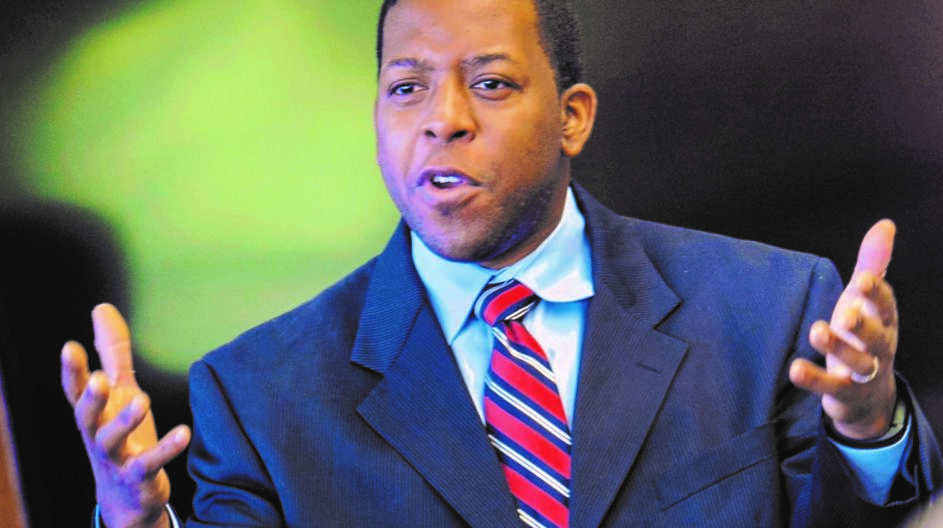
Dr. Raushan Gross Means Business
When Dr. Raushan Gross ’09 MBA was 11, he asked his mother for money to buy video games.
Gross, who’s now an Associate Professor of Business Management at Pfeiffer University, was turned down. “You’re going to have to learn the meaning of a dollar and the meaning of being able to work and provide for yourself,” he remembers his mother telling him.
Gross would take this, the first of several such lessons, to heart. He was soon passing out flyers advertising a pizzeria in his neighborhood, earning $5 for every 100 or so he got into the hands of potential customers.
By the time Gross was a teenager, he was working at fast-service restaurants for several hours each week – and begging his employers for even more work time, since his earnings enabled him to purchase much of what he wanted, including his own clothes.
At that point, Gross’ mother stepped in to teach her son another lesson, this one about saving enough money to pay the bills. She required him to set aside 20 percent of his pay for such expenses in their household as heat and food – a concept that could, of course, apply to effective entrepreneurship, one of the areas in which Gross now specializes.
“At first, it was difficult letting go of 20 percent of my paycheck,” said Gross, who grew up in Philadelphia and the Raleigh area. “But, over time, it became a natural thing to do.”
Gross says that he has “a lot to share in the classroom,” and he often illuminates theoretical concepts with real-world insights gained at a range of jobs he held before he was appointed full-time at Pfeiffer, in 2015. As a teenager during the middle 1990s, he worked for one year as a page in the North Carolina General Assembly. He later worked in retail and bank management, fuels analysis and city government.
He got his first taste of teaching by leading training sessions for his employers and by teaching as an adjunct or assistant at several North Carolina schools. He worked as he attended school, eventually earning a doctorate in business and organizational leadership from Regent University. He has been married for 14 years, with two children aged 9 and 3.
Ira Dorin ’20, now an Inside Sales Representative at CourtHabor, took several Gross-taught courses at Pfeiffer as he completed work toward a Bachelor of Science in business management and leadership. He said that Gross would often relate his extensive work experiences to what was being taught.
“This helped me understand the material and…what I might see in my career,” Dorin said, adding that Gross “would never let you leave his class without giving you insight or knowledge to take with you in life.”
Gross finds that, even though recent graduates typically start at the ground level, most students aspire to lead and are very interested in his first-hand experience of how managers motivate change. He coaches that a manager can lead as an educator, explaining why a particular change is being implemented. Or a manager can get people involved in the process or offer employees incentives to get them on board. Often, involving employees in a challenging project can do the trick.
Increasingly, Gross is honing his insights through scholarship and blogging. In 2020, he published an e-book for the Mises Institute: The Inspiring Life and Beneficial Impact of Entrepreneurs. The book proposes that the ground rules of entrepreneurial innovation rest on seven principles.
And when Gross isn’t writing books, he’s blogging for the institute’s Power & Market blog. Recent entries have argued that “Aggregate ‘Excessive’ Consumption Is Not a Problem” and “What Consumers Say Is Not as Important as What They Do in the Marketplace.”
If you take a class that Gross teaches at Pfeiffer, you won’t just acquire knowledge from books and lectures; you’ll also learn by doing. Reese Shelton ’20, who also holds a Bachelor of Science in business management and leadership, was a beneficiary. He is now working at H.W. Culp Lumber Co., a family business in New London, N.C. At some point, he will hold a management position that requires him to interview candidates for open positions. Gross taught him, in mock interviews, the types of questions to ask.
Gross stresses that he teaches from a “problem-solving perspective” that requires one to dig for information, to find the answers to get something done.
“Don’t be afraid of anything new,” he said. “Whenever you’re anxious or squeamish about something, that’s a sign of growth. If people ask you to do something that’s not in your job description, they only ask because they trust that you can do it.”
Ken Keuffel, who authored this article, has served as Pfeiffer’s Assistant Director of Communications since December 2019. He welcomes story ideas from Pfeiffer’s faculty, staff, students, alumni, and friends. The form for submitting story ideas is at Story Idea/News Item Request Form.